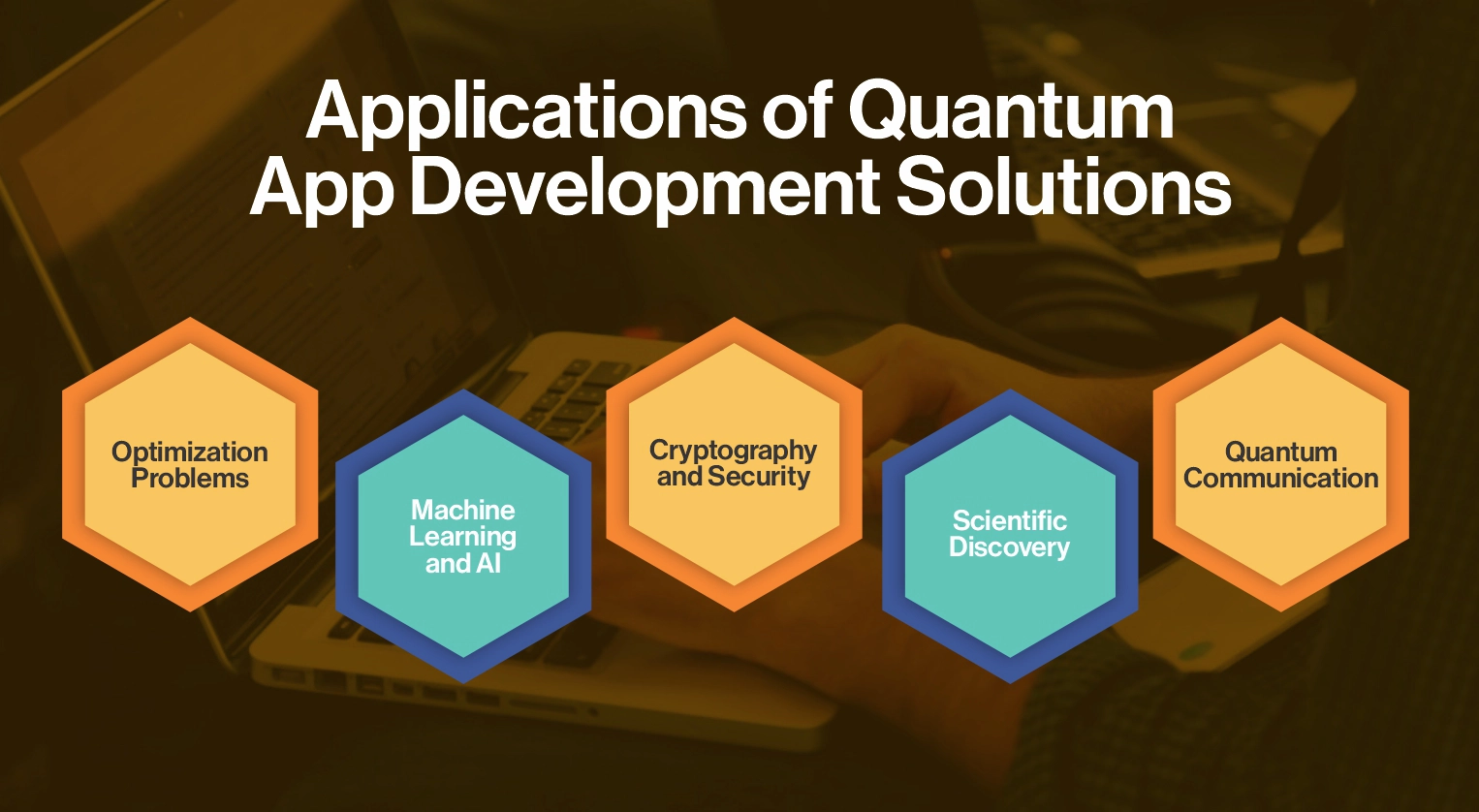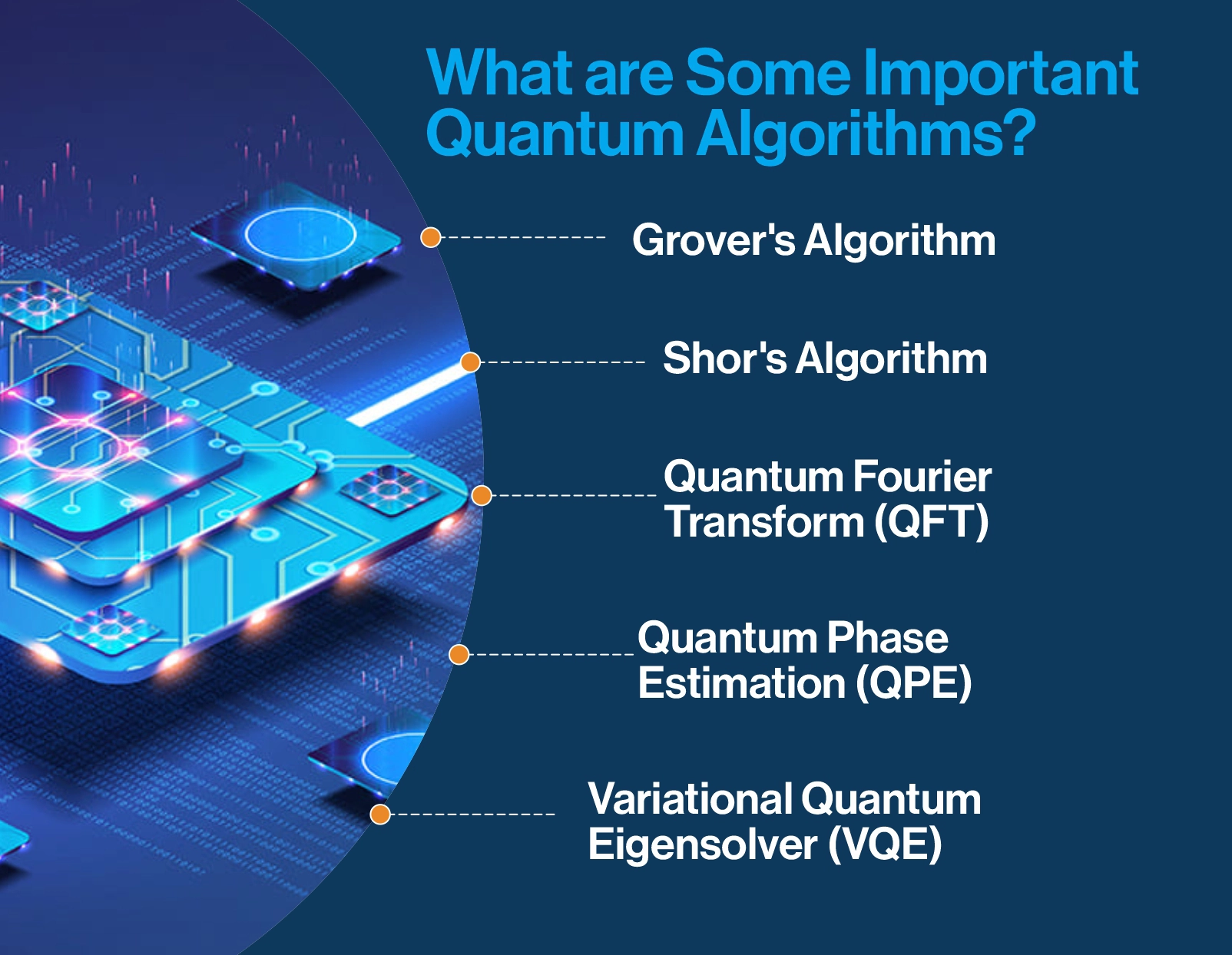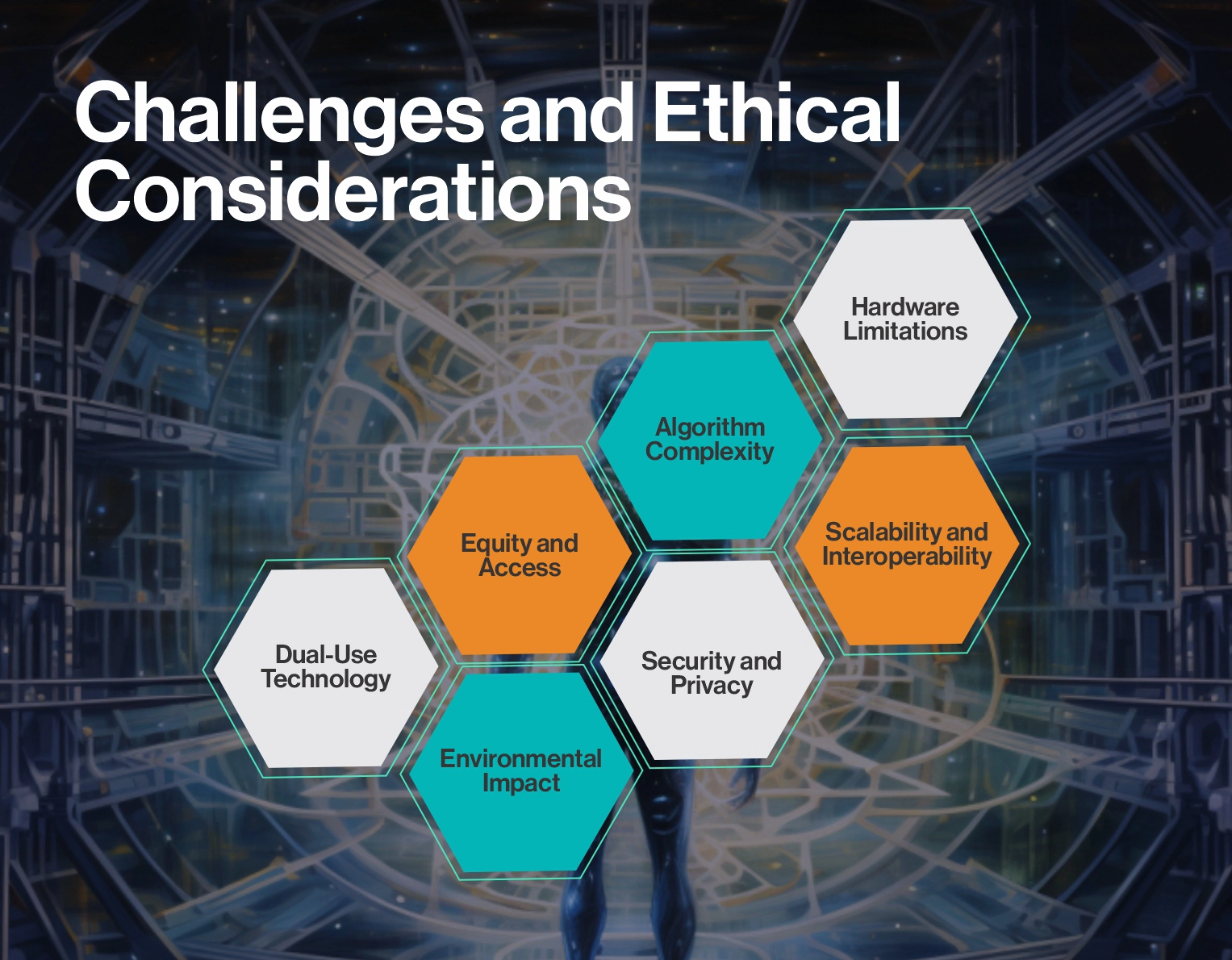The technology field is continually growing, pushing the world's boundaries. The digital era's workhorses have long been classical computers, but quantum computing opens up new possibilities.
Quantum computing stands out as a revolutionary frontier in the rapidly changing field of technology, offering previously unheard-of levels of computational power and efficiency. Quantum app development is a new field of opportunity that is opening up as companies investigate the possibilities of quantum computing.
With the use of quantum mechanics, this ground-breaking technology can execute computations in ways that are just not possible with ordinary computers. Consequently, the development of quantum apps is emerging as a new industry.
However, how does quantum app development differ from conventional app development, and what does it entail specifically? In this extensive guide, we'll examine the principles of quantum app development solutions, examine some of its uses, and discuss the long-term effects of this revolutionary technology.
Key Takeaways:
- Utilizes quantum mechanics for unparalleled computational power
- Creates apps for quantum computers, leveraging their unique abilities
- Quantum mechanics' superposition and entanglement enable quantum computing
- Quantum apps revolutionize optimization, machine learning, security, and more
- Include hardware limitations, complexity, and ethical considerations
- Leading the way include IBM, Google, Rigetti, and D-Wave
- Quantum computing disrupts industries, fosters global competition, and offers vast potential
Understanding Quantum Computing
Let us first create a fundamental understanding of quantum computing before we get into app development. Quantum computing uses the laws of quantum mechanics to calculate at a rate ten times quicker than traditional computing. Understanding the basic ideas of quantum mechanics and how they convert into computing power is crucial to understanding the complexities of quantum computing.
Superposition
Quantum mechanics is the field of physics that describes particle behavior at the tiniest sizes and provides notions of superposition. The idea of superposition allows particles to exist in several states simultaneously. Quantum computers use qubits instead of classical computers, which rely on either 0 or 1 bits. Qubits exist in a state of superposition where they can simultaneously be both 0 and 1 or any superposition of both states. These qubits embody the idea of superposition in quantum computing.
Entanglement
Another fundamental principle of quantum mechanics is entanglement. Entanglement occurs when the state of one particle becomes intrinsically linked to the state of another, regardless of the distance between them.
It is a valuable tool for quantum computation because it allows quantum systems to display correlations that cross classical limits. Thus, it will enable quantum computers to investigate many options simultaneously, significantly increasing their processing capability.
Quantum computation performs computations fundamentally distinct from classical computation by utilizing these quantum phenomena. Like classical logic gates, quantum gates allow quantum algorithms to control qubits and perform quantum data operations.
Because qubits can investigate many potential solutions at once, like superposition and entanglement, quantum algorithms can do some computer tasks much faster. They can carry out complicated calculations exponentially quicker than classical computers.
What is Quantum App Development?
Quantum app development is fundamentally about creating and optimizing applications for quantum computing systems. The inherent parallelism created by superposition and entanglement enables quantum computers to perform complex calculations at speeds exponentially faster than classical computers for certain types of problems.
This extraordinary computational capacity is used by quantum app development to address problems in various industries. Quantum applications can transform industries and open up previously uncharted creative territories. These applications range from encryption and machine learning to optimization issues. However, creating quantum applications necessitates a thorough understanding of quantum software, hardware, and algorithms.
Many programming languages, tools, and frameworks designed specifically for quantum computing settings are required for quantum app development. The tools and libraries needed to create and run quantum algorithms on quantum hardware are available via quantum programming languages like Qiskit, Quipper, and Cirq. These programming languages let programmers create quantum circuits, apply quantum gates, and work with qubits to accomplish various computing tasks.
Other aspects of quantum app development include optimizing algorithms and applications for quantum hardware designs. During the development process, particular features and constraints of quantum hardware, such as qubit arrays and quantum computers, must be considered. To obtain the best performance, quantum developers must optimize algorithms to minimize mistakes, maximize qubit coherence, and take advantage of hardware-specific features.
The Rise of Quantum App Development
Although there is still much to learn about quantum computing, researchers and developers eagerly pursue its possibilities. Quantum app development solutions aim to develop software specifically for quantum computers.
Through these applications, a new era of innovation across numerous industries will be ushered in with the ultimate goal of solving complicated issues that are currently unsolvable for traditional computers.
What Makes Quantum Apps Different?
Quantum apps are distinct from traditional applications in several keyways:
- Focus on Specific Problems: Quantum computers are very good at handling complicated simulations or issues with many variables. Such difficulties are frequently encountered during traditional software development.
- Specialized Programming Languages: Quantum computers require special programming languages because of their unique operating principles. While many of these languages are still in development, several well-known ones are Q#, Cirq, and TensorFlow Quantum.
- Limited Hardware Availability: Only a few research institutes and highly resourced major enterprises have access to quantum computers. This scarcity has an influence on the development and testing of quantum applications.
Applications of Quantum App Development Solutions

On the cutting edge of technical progress, quantum app development provides game-changing answers to some of the trickiest and most unsolvable issues in various fields. Quantum applications, taking advantage of quantum computing's unique capabilities, have the potential to revolutionize industries, accelerate scientific discoveries, and redefine how we tackle complicated challenges.
Some practical applications of quantum app development solutions include:
Optimization Problems
Optimization provides one of the most interesting use cases for quantum app development. Quantum algorithms, including the Quantum Approximate Optimization Algorithm (QAOA) and the Variational Quantum Eigensolver (VQE), are particularly good at solving optimization problems with large solution spaces and many variables.
Quantum optimization techniques can increase operational efficiency across various industries, optimize supply chain management and route optimization, and maximize portfolio returns. Supply chain management, banking, and logistics are just a few of the industries that use these algorithms.
Machine Learning and AI
Combining machine learning algorithms' capabilities with quantum computing's power, quantum machine learning offers a new frontier in creating quantum apps. Quantum machine learning techniques, such as quantum support vector machines and quantum neural networks, have advantages for handling big datasets and resolving challenging categorization issues.
By training and optimizing large neural networks, quantum machine learning algorithms take advantage of quantum computing's parallel processing power, producing progressively accurate predictions and insights.
These algorithms are useful in domains where computational constraints may prevent typical machine learning approaches from being as effective, such as financial modeling, materials science, and drug discovery.
Cryptography and Security
Cryptography and cybersecurity provide yet another exciting field of application for quantum app development. Because quantum computers can factor big numbers efficiently, they have the potential to undermine popular cryptography methods.
On the other hand, quantum cryptography, with its techniques such as quantum key distribution (QKD) and quantum-resistant cryptographic algorithms, opens up new possibilities for secure communication. Quantum cryptography protocols use the ideas of quantum mechanics to generate unbreakable cryptographic keys, enabling secure communication and data encryption.
Scientific Discovery
Quantum simulation also has the potential to speed up scientific discovery and advancement. Thanks to the unmatched accuracy and efficiency of quantum computers' simulations of quantum systems, researchers can model molecular structures, explore complicated quantum events, and optimize chemical reactions.
Quantum algorithms for simulating molecular structures and electronic properties enable drug design, materials discovery, and renewable energy research breakthroughs.
Quantum Communication
Additionally, the development of quantum apps opens up new possibilities for quantum sensing, quantum metrology, and quantum communication. Quantum communication methods offer secure and effective eavesdropping-resistant communication channels. These protocols include quantum key distribution (QKD) and quantum teleportation.
What are Some Important Quantum Algorithms?

The foundation of quantum app development is quantum algorithms, which let programmers use quantum computing's capabilities to effectively address challenging tasks. The following are some important quantum algorithms and their applications.
Grover's Algorithm
Grover's algorithm is a quantum search algorithm that, in contrast to classical techniques that need O(N) time, can search an unsorted database of N items in O(sqrt(N)) time. Database search, cryptography, and optimization can all benefit from the use of this technique.
Shor's Algorithm
Shor's algorithm is an efficient quantum method for factorizing huge composite numbers into their prime factors in the context of integer factorization. This technique could expose popular encryption systems like RSA to quantum assaults, seriously harming cryptography.
Quantum Fourier Transform (QFT)
Data may be efficiently transformed between the time and frequency domains thanks to the Quantum Fourier transform (QFT), which is a quantum variant of the classical discrete Fourier transform. Quantum error correction, quantum simulations, and quantum signal processing all depend on QFT.
Quantum Phase Estimation (QPE)
QPE is a quantum technique for estimating the eigenvalues of unitary operators. It has applications in quantum chemistry, simulation, and cryptography.
Variational Quantum Eigensolver (VQE)
A quantum procedure called VQE determines a molecule's ground state energy, which is crucial for drug development, materials science, and molecular modeling.
These algorithms are only a small portion of the enormous field of quantum algorithms. Each algorithm is designed to offer quantum app development solutions aiming to enhance the functionality of quantum computing.
Challenges and Ethical Considerations

Although quantum computing has a lot of potential, there are difficulties and ethical considerations for developers and companies to consider. Some important challenges are discussed below.
Hardware Limitations
The development of quantum hardware is still in its early stages, with restricted qubit error rates and coherence periods. Developers must optimize quantum algorithms to lessen the impact of defective hardware.
Algorithm Complexity
Quantum app development often demands a thorough grasp of mathematical ideas and quantum mechanics. Thus, making it difficult for developers unfamiliar with quantum computing fundamentals to implement quantum app development solutions.
Scalability and Interoperability
Developers must ensure that quantum applications are interoperable and scalable across various software environments and hardware architectures as quantum computing platforms advance.
Security and Privacy
Data security and privacy may be threatened by quantum computing's ability to crack popular encryption techniques. In the quantum era, protecting sensitive data requires careful consideration of the ethical issues surrounding secure communication methods and quantum cryptography.
Equity and Access
Ensuring fair access to quantum resources and education becomes increasingly important as quantum computing technology progresses. Ethical issues pertaining to workforce development, education, and technological access are crucial to stopping growing gaps in the adoption of quantum computing.
Environmental Impact
Due to its high energy and resource requirements, quantum computing raises questions regarding its environmental impact. To lessen the influence of quantum computing on the environment, ethical issues pertaining to resource management, sustainability, and energy consumption are crucial.
Dual-Use Technology
There are several uses for quantum computing technology, from national security to scientific research. Regarding dual-use technology, ethical considerations are crucial for averting unforeseen effects and fostering responsible innovation, including nuclear proliferation and autonomous weapons.
To address these ethical issues, stakeholders, such as researchers, legislators, and business executives, must work together to create frameworks and norms that support morally and responsibly applied quantum computing techniques.
Case Studies of Companies Pioneering Quantum App Development
Many businesses are at the forefront of developing the first quantum apps and using quantum computing to promote innovation in various sectors. Here are a few noteworthy case studies demonstrating the wide range of applications advancing the creation of quantum apps for the commercial market.
IBM Quantum
Through the IBM Quantum Experience platform, IBM Quantum provides developers with access to quantum computing resources, allowing them to explore quantum algorithms and create quantum applications. IBM Quantum has partnered with businesses such as JPMorgan Chase to investigate the possibilities of quantum computing in finance and optimization.
Google Quantum AI
Google Quantum AI is creating quantum computers, such as the Sycamore processor, with the goal of proving quantum supremacy and investigating the possibilities of quantum computing. Additionally, Google has teamed up with pharmaceutical firms like AstraZeneca to use quantum algorithms to speed up the discovery of new drugs.
Rigetti Computing
For developers and academics, Rigetti Computing offers quantum software tools and cloud-accessible quantum computing systems. Rigetti has worked with businesses such as Volkswagen to optimize traffic flow by applying quantum-inspired optimization techniques and quantum algorithms.
D-Wave Systems
D-Wave Systems is a quantum annealing technology company that sells quantum computers that are meant to solve optimization issues. D-Wave has worked with businesses like Volkswagen to optimize logistics and vehicle routing using quantum annealing.
Future Implications
Quantum apps and technologies have enormous and varied future consequences that span technological, scientific, economic, ethical, and geopolitical domains. However, to fully use quantum technology, proactive measures are needed to overcome obstacles, promote cooperation, and guarantee that quantum innovation serves mankind.
We may anticipate an upsurge in quantum applications that tackle some of humanity's most critical problems as long as quantum hardware and algorithms continue advancing. Here are some future implications of quantum technology.
Disruption of Traditional Industries
Early adopters of quantum technology could benefit from competitive advantages as it can potentially disrupt established industries and business paradigms. Quantum optimization, machine learning, and simulation can drive efficiency benefits and innovation in industries including finance, logistics, and medicines.
Evolution of Quantum Computing Ecosystem
The expansion of quantum technology is imminent and demands the establishment of a strong ecosystem for quantum computing that includes education, software, and hardware. Producers of quantum hardware, software, and educational initiatives greatly aid the upkeep of the quantum computing environment and innovation.
Global Competition and Collaboration
Global competition and cooperation around quantum technology have centered on this field, with countries striving to take the lead in quantum research and development. International cooperation and collaboration are crucial to advancing quantum technology and solving common issues like quantum security and standards.
Conclusion
To sum up, developing apps for quantum computing is a paradigm shift that offers previously unheard-of chances for creativity and problem-solving. The potential applications of quantum app development are virtually endless, ranging from supply chain optimization to healthcare revolutionization and cybersecurity enhancement.
Developers at FiveRivers Technology possess a thorough comprehension of the principles of quantum computing. We prioritize investigating useful applications and resolving significant obstacles while taking advantage of the potential of quantum application development to uncover novel technological prospects and propel future successes.
At FiveRivers Technology, we respect moral standards and work together to create a fair and bright future for everyone as we negotiate the challenges of quantum computing. Let's embrace the revolutionary potential of quantum computing as we set out on this voyage into the quantum realm and open the door to a better future.
FAQs
What is Quantum Software Used For?
Quantum software is used for various purposes such as cryptography, optimization, simulation of quantum systems, and machine learning algorithms.
What is Quantum Computing in AI?
Quantum computing in AI refers to the application of quantum mechanics principles to enhance computational power for solving complex problems in artificial intelligence. Unlike classical computing, which uses bits to represent information as either 0 or 1, quantum computing uses quantum bits (qubits) that can exist in multiple states simultaneously, allowing for parallel processing and potentially exponential speedup in certain AI tasks such as optimization, machine learning, and cryptography.

